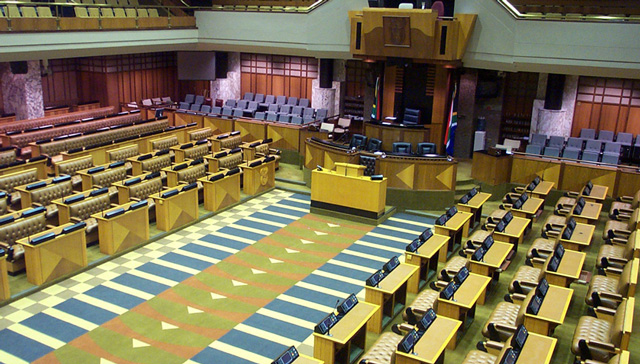
Media houses and other parties are asking the Western Cape high court to find that a clause in parliament’s broadcasting policy is unconstitutional and invalid because it does not allow the public to view all activities on the floor.
Steven Budlender, for the applicants, told a full bench on Monday that they were challenging the clause that dealt with coverage of unparliamentary behaviour and grave disorder.
Media24, Primedia, the South African National Editors’ Forum and two other parties wanted the court to find this clause unconstitutional and invalid, and for parliament to be instructed to treat incidents of grave disorder in the same way as unparliamentary behaviour.
They also wanted the court to find that the use of a signal jamming device during the state of the nation address in February was unlawful.
Presently, the policy gives a broadcasting director the discretion to use occasional wide-angle shots during cases of unparliamentary behaviour.
No provision is made for shots during a grave disturbance, and the policy does not define what is considered a grave disturbance.
The parties had failed in their application last month for an urgent interim order enforcing uninterrupted audio and a wide angle shot of the chamber during disruptions, pending final relief.
The application followed the eviction of Economic Freedom Fighters’ MPs from the house during President Jacob Zuma’s state of the nation address in parliament on 12 February, which was not broadcast.
The parliamentary feed that day instead focused on speaker Baleka Mbete and national council of provinces chairperson Thandi Modise.
Some journalists took cellphone footage of the incident, in contravention of the broadcasting policy, but could not file stories in the chamber because the signal seemed to be jammed.
“What this court is asked to make a finding on is that it is inconsistent with our constitutional scheme for an incident with this importance to rely on a second-hand version of what happened,” Budlender said.
“We didn’t get to see what happened on the floor of our parliament and we are therefore not able to make a proper judgement.”
Budlender added that unparliamentary behaviour was often a contested question and involved people raising what they considered to be legitimate issues.
The applicants were relying on the constitutional provisions of the right to freedom of expression and the openness of parliament.
The court heard that there were already sufficient safeguards in place to ensure broadcasters properly handled the feed that parliament provided.
Budlender argued that it was incorrect for the respondents to say that broadcasting an uninterrupted feed would compromise parliament’s dignity.
“It doesn’t undermine the dignity of parliament for people to see. The public is entitled to, and needs to see, in order to assess it and make their own judgment calls.
“We are unaware of any authority that says freedom of expression can be restricted because it makes such an institution looks bad.”
Budlender said such a principle would be extraordinary in a constitutional scheme such as South Africa’s. — News24

